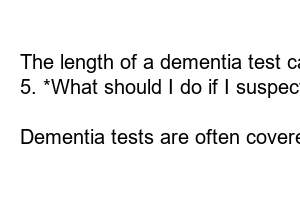보건소 치매검사
Are you or a loved one concerned about memory loss and the possibility of dementia? If so, booking a dementia test at a Health Center could provide answers and guidance for the future. Let’s explore what to expect from a dementia test and how it can help in detecting and managing this condition.
**What is a Dementia Test at a Health Center?**
A dementia test at a Health Center involves a series of assessments to evaluate memory, thinking, and reasoning skills. These tests are often conducted by healthcare professionals, such as doctors or psychologists, who specialize in cognitive disorders.
**Why is a Dementia Test Important?**
Early detection of dementia is crucial for receiving appropriate treatment and support. A dementia test can help identify changes in memory and cognitive function, allowing for interventions to slow down the progression of the disease.
**What to Expect During a Dementia Test?**
During a dementia test, you may be asked to complete tasks that assess memory, language, attention, and problem-solving abilities. These assessments can help healthcare providers determine if there are any signs of cognitive decline or impairment.
**How to Prepare for a Dementia Test?**
Before your dementia test, it’s important to gather any relevant medical information, such as your medical history and list of medications. You may also want to bring a family member or friend for support and to provide additional information about your symptoms.
**What Happens After a Dementia Test?**
After completing a dementia test, your healthcare provider will review the results with you and discuss next steps. This may include further testing, referrals to specialists, or recommendations for treatments and support services.
**Benefits of Early Detection and Diagnosis**
Early detection and diagnosis of dementia can lead to better outcomes for individuals and their families. It allows for early intervention, access to support services, and the opportunity to plan for the future.
**Summary**
A dementia test at a Health Center is an important step in identifying and managing memory and cognitive changes. By undergoing this assessment, individuals can receive early detection and diagnosis, leading to better outcomes and improved quality of life.
**FAQs**
1. *What are the common signs of dementia?*
Common signs of dementia include memory loss, difficulty with language, changes in mood or behavior, and trouble with everyday tasks.
2. *Is dementia more common in older adults?*
Dementia is more common in older adults but can also occur in younger individuals, especially in cases of early-onset dementia.
3. *Can dementia be prevented or cured?*
There is currently no cure for dementia, but healthy lifestyle choices, such as eating a balanced diet, staying physically active, and engaging in mentally stimulating activities, can help reduce the risk of developing the condition.
4. *How long does a dementia test take?*
The length of a dementia test can vary depending on the specific assessments being conducted but typically takes 1-2 hours to complete.
5. *What should I do if I suspect a loved one has dementia?*
If you suspect a loved one has dementia, encourage them to seek an evaluation from a healthcare provider. Offer support and assistance in scheduling a dementia test and providing emotional support throughout the process.
6. *Are dementia tests covered by insurance?*
Dementia tests are often covered by health insurance, but it’s important to check with your provider to understand what services are included in your plan and any out-of-pocket costs you may incur.

